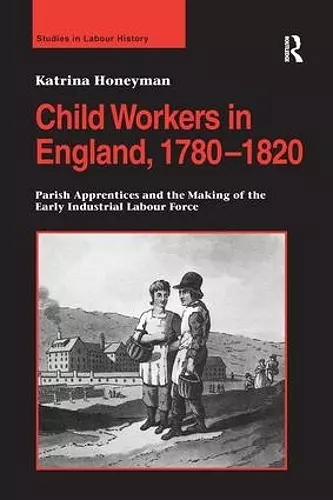Child Workers in England, 1780–1820
Parish Apprentices and the Making of the Early Industrial Labour Force
Format:Hardback
Publisher:Taylor & Francis Ltd
Published:28th Oct '07
Currently unavailable, and unfortunately no date known when it will be back
This hardback is available in another edition too:
- Paperback£52.99(9781138273344)

The use of child workers was widespread in textile manufacturing by the late eighteenth century. A particularly vital supply of child workers was via the parish apprenticeship trade, whereby pauper children could move from the 'care' of poor law officialdom to the 'care' of early industrial textile entrepreneurs. This study is the first to examine in detail both the process and experience of parish factory apprenticeship, and to illuminate the role played by children in early industrial expansion. It challenges prevailing notions of exploitation which permeate historical discussion of the early labour force and questions both the readiness with which parishes 'offloaded' large numbers of their poor children to distant factories, and the harsh discipline assumed to have been universal among early factory masters. Finally the author explores the way in which parish apprentices were used to construct a gendered labour force. Dr Honeyman's book is a major contribution to studies in child labour and to the broader social, economic, and business history of the late-eighteenth and early-nineteenth centuries.
’This well-documented study is the first full account of pauper apprentices, the children bound most often to factory work by parishes anxious to reduce poor relief...Essential.’ Choice ’Honeyman's book is a major addition to scholarship.’ Childhood in the Past ’... a richly detailed and rigorously constructed account of a unique period in modern Western history--the beginning of the industrial age. ... (Honeyman) has done a vast amount of work in dozens of parishes and factory record collections to create a far more detailed and nuanced picture than we have ever had of the subject. ...Through her diligent research, careful scholarship, and persuasive arguments, the long-lost legion of Olivers have gained a voice. This is a fine book, and should certainly take its place as an important contribution to the study of the Industrial Revolution.’ H-Albion ’...impressively detailed and meticulous research... The author modestly ackowledges, despite her researches "there is more evidence to be retrieved". But it is difficult to envisage many scholars undertaking such wide-ranging and painstaking research into this subject in the foreseeable future or seriously challenging many of the well-supported and balanced conclusions here. Until and unless they do, this will stand as the definitive study of the system and its significance, and should be required reading for anyone interested in the development of the early industrial workforce, the operation of the Poor Law and, above all, the treatment and experiences of children themselves.’ Northern History ’This is a fascinating study, and an excellent read.’ Economic History Review ’This is a meticulously researched and vary balanced investigation. It is the work of a very experienced economic historian.’ EH.NET ’This lucidly written study provides important groundwork for child labour studies for years to come, directing attention to a new set of archival records and drawing fruitful connecti
ISBN: 9780754662723
Dimensions: unknown
Weight: 816g
354 pages